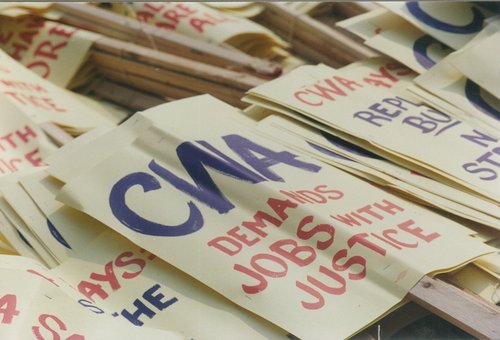
Only a week after CWA president Chris Shelton asked his members whether they were ready to “kick some a**” when their contract expired on August 1st, the CWA and IBEW announced that they would not walk off the job after all.
Rather, in a sign of what may be argued by some as weakness on the part of union leadership, the two unions stated they will continue working without a contract and vowed, according to the CWA’s website, to “continue their fight” while on the job.
Leaders of the Communications Workers of America and the International Brotherhood of Electrical Workers announced that 39,000 Verizon workers up and down the East Coast will work without a contract when their collective bargaining agreement expires at midnight tonight, and continue their fight for a fair agreement while on the job.
The union leaders also announced that they will leave the sites of round-the-clock bargaining in Philadelphia and Rye, NY, where union and management teams have been meeting since June 22nd in what has so far been a vain attempt to reach a contract. The unions have informed the company, however, that they are prepared to schedule regular bargaining sessions, and urged the company to begin bargaining constructively.
While the move by the CWA and IBEW leaders to call off their strike may disappoint members who were ready to “fight,” it really is not all that surprising. The CWA and IBEW do not have the leverage they once had.
Unlike when the unions struck in 2000, when there were 85,000 union members working at Verizon, the unions now only have 39,000 members as more and more of the industry has moved toward wireless technology.
As in 2011, Verizon appears to have, once again, prepared for a strike by bringing in thousands of replacement workers, further weakening the unions’ main weapon.
The last time the unions struck Verizon in 2011, the unions called off the strike after a mere two weeks when they realized the tactic was not moving the company any closer to agreement.
For the union leaders, it appears their backing down from striking may be one of prudence and their reference to continuing the fight while on the job may be referring to conducting job actions while on-the-job.
Although not as effective as a strike can be when a union has leverage, ‘on-the-job’ actions can be disconcerting of an employer’s business. and often include:
- Work-to-rule
- Red t-shirt and/or black armband days
- Informational picketing
- Rallies
- Picketing executives’ homes
- And more…
According to the CWA’s Mobilization Manual [p. 29]:
If the bargainers decide to continue to work withor without a contract, mobilization needs to gointo high gear. The members need to be in-formed on their rights in the workplace and mobilization actions need to be planned both inside the workplace and outside the work-place to keep pressure on the employer.
While the unions at Verizon can still call their members out on strike at any time, by calling the strike off now, when members were most ready to walk off their jobs, makes calling a strike later more difficult in the future.
Mobilization Manual of the Communications Workers of America by LaborUnionReport.com






Was this article written by the company? While union numbers are fewer the wireline business still makes money and is essential for wireless services to operate. During the 2011 strike the “highly trained replacements” only made matters worse and had the leaders either got a written agreement prior to sending workers back or waited out Hurricane Irene the results would have been much different. The company has no leg to stand on with their concession demands considering what other locals have gotten recently with their contracts and the fact that typically workers are asked to accept cuts when companies are losing money (think UAW here). VZ’s only motivation here is to bring the contracts in sync with the wireless side (underpaid/overworked/no longevity) to increase shareholder returns. They are not customer driven anymore but rather shareholder driven which only gives short term gains while decaying long term sustainability.
No, Paul. Just an observer (and former CWA-er).
When Lowell McAdam, CEO of Verizon, publicly states his #1 mission is to break the Union, our staying on the job (after Verizon has spent goodness knows how much money to line up replacement workers), is a brilliant strategy. I take issue with your statement that the Union “blinked”. Why should the Union give Verizon exactly what they hoped for? The draconian demands and lack of any effort to negotiate on the company shows that they are TRYING to get us to walk so they can proceed with their objective of eliminating all union employees.
“Although not as effective as a strike can be when a union has leverage, ‘on-the-job’ actions can be disconcerting of an employer’s business. and often include:”
Carrying the fight on the job is real brilliant tactic that demonstrates the union workers are more of a liability on the job instead of locked out…some deep thought there.
the company know cwa’s leaders are weak. the members are’nt as they used to be. (sellouts) as their union bosses. by 2020 the union for verizon will be done. servre them right for screwing their members for years. 50% of the members will cross the picket lines after 1 month because their union does nothing for them. good luck! rumor has it that this union eats steak dinners with the CEO’S.